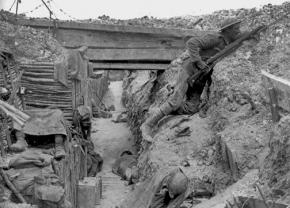The youth challenge to war
introduces the statement of socialist youth against the First World War, as part of a series about the socialist response to the slaughter 100 years ago.
ON APRIL 7, 1915, a meeting of youth representatives in Bern, Switzerland, adopted a ringing manifesto against the war then raging in Europe and relaunched the international socialist youth movement on an antiwar platform.
The Socialist Youth International, formed in 1907, had campaigned actively against militarism. But when the war broke out, its bureau ceased functioning, and fraternal ties among its member organizations were broken off. The initiative to rebuild the International came from socialist youth in neutral Switzerland, neutral Italy and also in Stuttgart--the home of Clara Zetkin and a stronghold of antiwar forces in the German Social Democracy.
Youth leagues with a total membership of 34,000 were represented at the Bern meeting, with delegates representing Norway, Denmark, the Netherlands, Germany, Switzerland, Italy, Poland, Bulgaria and Russia.
The debate followed lines similar to that at the women's conference held 10 days earlier. Bolshevik delegates pressed unsuccessfully for adoption of an explicitly revolutionary course against the war. They voted against the final resolution, which was adopted by 19 votes to 3. Scandinavian delegates secured adoption of the demand for disarmament by a vote of nine to five.

A new international secretariat was established in Zürich, with Willi Münzenberg as secretary. A quarterly magazine was launched, called Jugend-Internationale (Youth International), which became an important instrument for discussion among antiwar socialists.
During the years that followed, units of the Socialist Youth International were in the lead in antiwar and revolutionary movements in several countries and, after the war's end, in the formation of Communist parties. When the Communist International was formed in 1919, the entire youth International affiliated to it, becoming its youth wing.
Below is the appeal adopted by the 1915 Bern conference.
Appeal of international youth conference
The international socialist youth conference, meeting April 5-7, 1915 in Bern with delegates from seven countries, renews the decisions of international socialist youth conferences in Stuttgart (1907), Copenhagen (1910), and Basel (1912) calling on worker youth of every country to join in struggle against genocidal war and militarism.
The conference notes with deep regret that, when the war broke out, in most countries, the [socialist] organizations of youth, just like those of adults, failed to carry out these decisions.
The present war is the result of imperialist policies of the ruling classes in every capitalist country. Even where the ruling classes and their governments present it as a defensive war, it is caused by these same policies, inseparable from capitalism and hostile to the people. The war is irreconcilably counterposed to the interest of the working class, threatening and destroying its vitality, crippling its organizations and hampering its capacity to act against the world's exploiters.
The policy of "civil peace" represents Social Democracy's abdication as a party of proletarian class struggle and its abandonment of the vital interests and ideals of the proletariat.
Based on these considerations, the international socialist youth conference calls for an immediate end to the war. It welcomes the efforts of party units in the belligerent countries--and especially the decisions of the international proletarian women's conference--to renew class-struggle actions and thus force the ruling classes to conclude peace.
The conference protests emphatically against attempts to enlist the socialist youth organization in the service of the bourgeois imperialist youth guards. This aims to divert the worker youth from their proper task of socialist education, through struggle, against capitalist exploitation and militarism.
One of the horrendous results of the present war is to employ youth who are barely past school age as cannon fodder. Given that fact, the conference underlines the need to show young men and women workers of every country how the war and militarism originate and take shape as side effects of the capitalist social order. We must educate them in the spirit of the international class struggle. This will rally them in growing numbers and with growing conviction to the banner of revolutionary socialism.
Source: The text has been translated from Richard Schüller, Geschichte der Kommunistischen Jugendinternationale, Berlin 1929-31, pp. 101-2.


